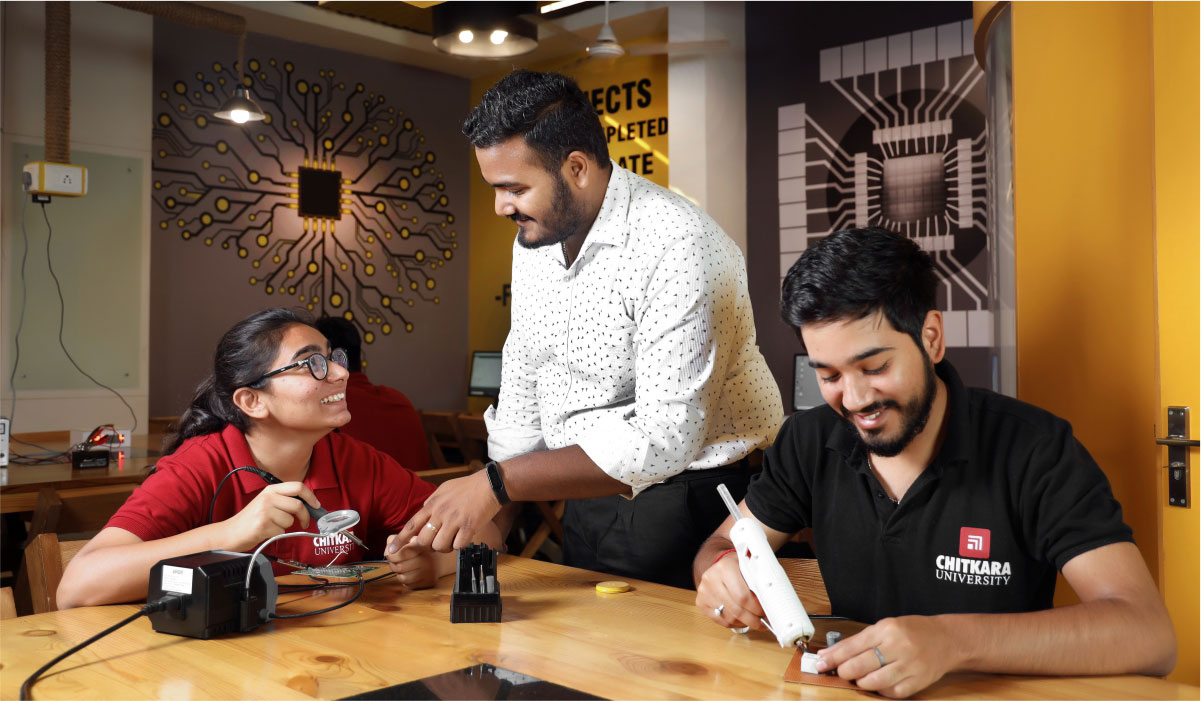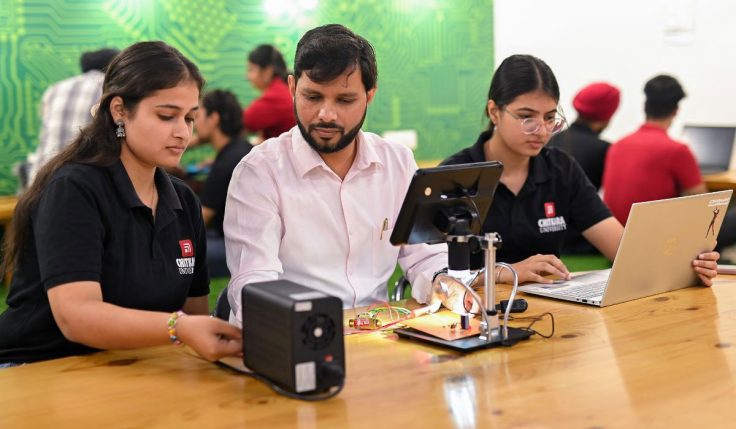Semiconductors are crucial elements used in appliances to regulate the electricity flow and support the ideal operation of electronics. It is the brain of electronics and is used in refrigerators, LED, solar panels and several other appliances across industries ranging from communications, defence, computing, healthcare, transportation, green energy and many more.
Given its exceptional significance for self-reliance in manufacturing and becoming a global hub for electronics, the Government of India has taken several steps in recent years to develop a Semiconductor manufacturing ecosystem in India.
Extensive expenditure on Semiconductor manufacturing in India can open up thousands of job opportunities and business prospects for a student pursuing Electrical Engineering and related engineering fields.
Along with a degree in electrical engineering, a top engineering university is also vital consideration because it provides an ideal platform to kickstart your career on a high note. Therefore, we recommend Chitkara University to learn industry-endorsed programs that groom the best engineering professionals.
Notable Steps of the Government of India to Encourage Semiconductor Ecosystem in India
The world market has experienced an acute shortage of Semiconductors during the corona period. It caused millions of dollars worth of loss and generated the need to manufacture the chip that runs the world.
To leverage the opportunity and become a Semiconductor manufacturing hub, the Indian government has taken several notable steps, such as:
- The Indian government has announced a Rs 76,000 crore PLI scheme to promote domestic Semiconductor and display manufacturing.
- India Semiconductor Mission (ISM) has been set up under Digital India Corporation as an Independent Business Division. The vision includes a 10-year plan AtmaNirbhata in Electronics and Semiconductors.
- Modernisation of Semiconductor lab in Mohali under Brownfield project
- Product design-linked incentive and deployment-linked incentive
- The government of India has established R&D and Incubator facilities. At present R&D centres are running at Semi-Conductor (SCL) Mohali, Society for Integrated Circuit Technology and Applied Research (SITAR), Bengaluru, and Gallium Arsenide Enabling Technology Centre (GAETEC).
- Gallium Nitride (GaN) Ecosystem Enabling Centre and Uncubator for High Frequency and High Power Electronics at IISc, Bengaluru.
Semiconductor Industry Landscape in India 2023
- The government’s incentives, seminars, and support for the Semiconductor industry are showing impressive outcomes. According to a Deloitte report, the industry can reach US$55 by 2026.
- The major share of the industry will be occupied by smartphones, wearables, automotive components, data storage devices, and computing.
- US Semiconductor Industry Association and India Electronics and Semiconductor Association have decided to form a Private Sector Task Force in January’23 to encourage Semiconductor manufacturing.
- India, Japan, and Australia announced to plan a Semiconductor supply chain initiative in 2021.
- The Vedanta-Foxconn JV was finalised and officially confirmed on 20th Feb’23 to set up a Semiconductor and display manufacturing facility at Dholera Special Investment Region, near Ahmedabad.
- ISMC, an international consortium and Singapore-headquartered IGSS have committed US$3 billion and INR 256 billion respectively to set up Semiconductor fabs in Karnataka and Tamil Nadu.
- The Indian government has confirmed proposals from five companies to set up plants for making display units and electronic chips. They will bring an investment of approx INR 1.53 trillion.
Opportunities for Electrical Engineers and Related Fields of Engineering
Government incentives, modernisations and the creation of R&D facilities, industry participation will generate thousands of jobs for electrical engineers, test engineers, integration engineers, and so on.
According to a report published in Economic Times, the industry will require around 85,000 specialised engineers. Therefore if you are considering an engineering program in electrical engineering, the time is now. Explore NAAC A+ accredited top engineering university in India Chitkara University, and design chips to reshape the world.
How to Leverage the Opportunities of the Semiconductor Industry as an Electrical Engineer in India?
As a B.E. in Electrical Engineering from one of the top colleges in India, you are placed in a better position to leverage the contemporary advantages of the booming Semiconductor industry in India.
Electrical Engineers broadly design, develop, and test electronic and electrical appliances and systems. Engineers in the Semiconductor industry design and develop components for electronic appliances. They work mostly on silicone along with gases and chemical solvents.
Therefore, the Semiconductor industry requires expert Electrical Engineers to steer the ship to make India a global Semiconductor manufacturing hub.
Aspirants of Electrical Engineering Programs can rest assured of a promising future with ever-rising demand for chips to run communication devices, and appliances across industries and government bodies.
Steps to Become a Top-Class Semiconductor Engineer
- Enrol for an industry-ready 4-year B.E. in Electrical Engineering from one of the top-ranked universities in India.
- Other undergraduate engineering options are Bachelor in Material Science and Engineering or Applied Physics with Material Science.
- You can go for advanced studies with M.Tech in Electrical Engineering and research for top-level jobs or research opportunities in the Semiconductor industry.
- Attend and complete related certification courses with industry-specific updates.
- Gain experience through an internship, entry-level jobs, and more
Let us explore why Chitkara University should be at the top of your list.
B.E. in Electrical Engineering at Chitkara University
- The University offers an industry-linked B.E. in Electrical Engineering with an outcome-based curriculum made under expert supervision.
- The program includes six months to 1 year of industrial training at one of the blue-chip corporations.
- Career-enhancing placement opportunities at Fortune 500 companies
- It prepares innovators of green solutions for sustainable industrial operations.
- Industry-sponsored world-class labs and facilities such as the Automation Centre of Excellence, Low and High Voltage Lab by Schneider Electric and more
- Specialised modules for trained professionals in industrial automation and prepare electrical engineers ready for the industry from day 1
- Excellent track record of placements, packages, and esteemed recruiters from private and public sectors of national and international prominence.
Synopsis
Electrical Engineers are for a treat with the ever-rising demand for Semiconductor manufacturing in India and globally. It is essential for mobile devices, appliances, and all other electrical and electronic devices and systems across Industries. Its significance is second to none in the digital world of today. Therefore pursuing a B.E in Electrical Engineering is a wise decision for giving a flying start to your career.
To add a cherry on the cake, research and enrol at a leading engineering university to multiply your chances of a desired successful career graph.






